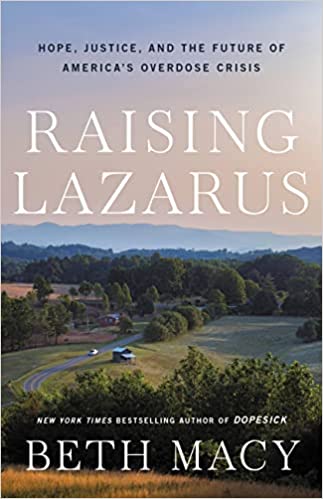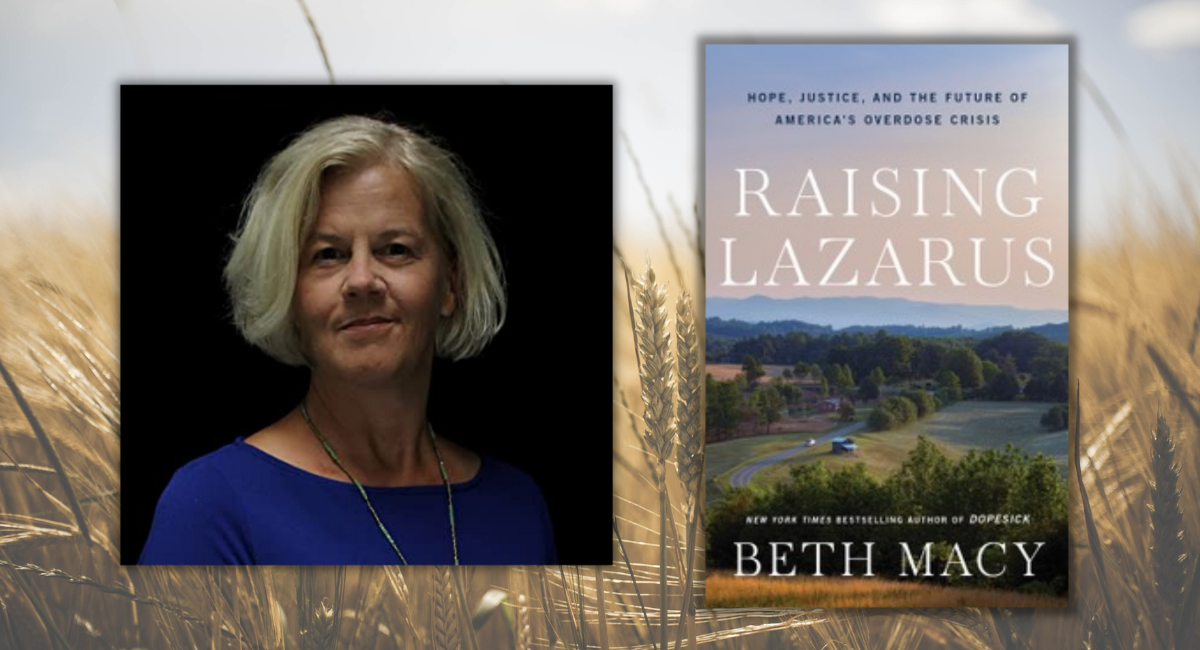Raising Lazarus: Hope, Justice, and the Future of America’s Overdose Crisis by Beth Macy
HOPE FOR A TROUBLED NATION
Haven’t we all been looking for answers to the epidemic of substance use disorder (SUD), opioid use disorder (OUD) and the burgeoning death toll from overdose in our country? We need some hope, and Beth Macy has served it up in Raising Lazarus: Hope, Justice, and the Future of America’s Overdose Crisis (Little, Brown, and Company), albeit with difficult hurdles to overcome — stigma for one and the lingering War on Drugs for another.
In her book Dopesick, Macy gave us the details of how unsuspecting people who took the medicine prescribed by their doctors became the victims of Purdue Pharma and the Sacklers. Doctors were lied to about the addictive qualities of their new pain killer, OxyContin, and were targeted to be unknowing dealers for the company. Distributors took advantage of the market for the drug and flooded communities with it. Public awareness grew exponentially when Hulu made the book into a limited series. In full disclosure, I used Dopesick as one of my sources of research for writing my own book, White Flag (Legacy Book Press), in an effort to understand how the opioid crisis played a part in my niece’s addiction.
INTRODUCING THE NEW NORMAL
The miracle of Raising Lazarus, I think, is that it succeeds in humanizing a group of people who have been so stigmatized in our society that they remove themselves from their community as much as they can. Bringing them back to some kind of normal life is no easy task. It is down and dirty work that takes fortitude. Macy uses the biblical story about Lazarus, when Jesus’ followers had to roll the stone from Lazarus’ tomb, and then after he is brought back to life, doing the “messy work of pulling the burial shroud off Lazarus.” In homage to those followers, she calls the harm reduction workers “Stone Rollers.” In Raising Lazarus, Beth Macy rolls stones to uncover some measures of hope to stem the crisis of overdoses.
As she did in Dopesick, Macy gets up close to the harm reductionists, who are working to keep people alive — and hopefully into recovery. They are the stone rollers and the ones tugging on the shroud of those with SUD (Substance Use Disorder). A constant message is, “You can get better.” Harm reduction takes the form of supplying clean needles, testing and medicine for Hepatitis C and HIV, supplying buprenorphine to fight dope sickness and overdose, and providing necessities like food and water. The book is not short on statistics to support this kind of care but is brutally honest about the fact that sometimes it works and sometimes doesn’t. Macy doesn’t shy away from telling us about the relapses and overdoses along the way.
The book includes a detailed telling of the proceedings against the Sacklers, highlighting once again the callus attitude of Richard Sackler (President of Purdue Pharma) throughout. Trying to evade paying their settlement through bankruptcy, and the fight against that tactic, is interesting legalese minutiae while exposing the Sacklers’ determination not to pay out the settlement.
COMPASSION FIRST
Once again, Beth Macy has peeled back layers of a very complex issue to help us understand just what it will take to combat this crisis. Compassion for those suffering is paramount, but practical measures like safe injecting sites, easily procured medicine to assist with recovery, and treatment instead of prison are important.
Treating those with Substance Use Disorder as human beings is the message woven through the book. It is a good one to take in.
Q&A: BETH MACY AND JUDY L. MANDEL
I had the pleasure of speaking to Beth Macy to add to this review. After congratulating her for the two Emmys that the limited series Dopesick won, below is part of our conversation.
Judy L. Mandel (J): What are your hopes for the impact Raising Lazarus may have?
Beth Macy (B): That with litigation settlement money beginning to flow to communities, that decision makers will read the book and understand that there are a lot of evidence-based, well-documented practices that actually work. I hope the money doesn’t funnel to abstinence-based programs and rehabs when most people don’t need to go to rehab. Also to just drug war programming. Jail and prison and death should not be the end of the story for so many people, but too often it is.
J: You mention that most people don’t need to go to rehab — can you explain?
B: That’s a quote I got from the American Society of Addiction Medicine, that only 1 out of 4 people need rehab. Folks are better off taking MAT (Medically Assisted Treatment) with counseling and social support. Social support is really important.
J: Why are you so devoted to this topic of SUD (Substance Use Disorder) and OUD (Opioid Use Disorder)?
B: I’m just a journalist. I grew up in a family that was hurt by addiction for many generations, so maybe that’s part of it. But mostly I started writing about it for my newspaper in 2012, and then went back to reporting on it and expanding it for the book, Dopesick, in 2018. And after that came out, I thought I was done with it, because it was just so dark. Then as I started traveling around the country talking about Dopesick, and I started hearing about some things that were working. A lot of them were counterintuitive. Like that needle exchanges are places to build trust and get connected to care whereas they haven’t been for a long time. And MAT, there is so much science and evidence supporting its efficacy, particularly when compared to abstinence-only programs. They are much less likely to die. So we need to get that message out there.
J: This may be a difficult question. In the book, you quote someone saying there is no recovery without Jesus, especially in the bible belt where you were. I wrote about my niece’s substance use disorder and death from an overdose in my book, White Flag. She was Jewish and recoiled from many of the Christian-based rehabs and 12-step options — and so didn’t even get that kind of help when it was an option. Do you think there is, or should be, a more secular approach that works?
B: What was said in the book is that you need to be culturally sensitive. So if you are writing about recovery in the Bible Belt, you need to be culturally sensitive because everybody responds to treatment in different ways. And your niece’s experience is another argument for being culturally appropriate. A Christian rehab would not be appropriate for her at all. The problem is that with the religious-based programs, a lot of them are free, and if people don’t have access to an evidence-based rehab, because it’s expensive or they live in a non-Medicaid expansion state, that’s where the government needs to step in with these opioid dollars.
J: What can people do in their own communities to help those with SUD, OUD — and their families?
B: Some communities have coalitions, but a lot of them get hijacked by abstinence-only people, which is dangerous. People die because of it. Just do your homework and educate yourself. I know that harm reduction works, as a gateway to MAT, which is a gateway to recovery. So, reach out to your local harm reduction coalition and support them. They are very underfunded, they always need money and donations of supplies like clothes, and computers so people can apply for jobs. They need people to pack wound care kits and Narcan kits. If you really want to get in there to help, that’s the place to start.
I also want to mention this group called Truth Pharm, trying to make the politicians wear the deaths and advocate for being sure the money from the settlements gets to the harm reduction groups. Working with groups like Truth Pharm is another way to respond to this. They have a rally planned for September 24th in D.C. People can plan to join them for that, too.
J: What kinds of discussions are you hearing at your book talks and events?
B: You might remember in the book the part where I was speaking to a group of Indiana sheriffs, and nobody clapped for me. But recently I gave a talk in North Carolina, another non-Medicaid expansion state, and came out hard with what I believe, and this is why I believe it. I showed the pictures of the people I wrote about and told their stories, and I got a standing ovation. There was law enforcement in the group. About two-thirds of the people stood up, so not all. But as my husband pointed out, the third of the people who didn’t stand up saw all the people standing and see that opinion is starting to shift about this issue and how it needs to be addressed.
J: Finally, how has writing this book affected you personally?
B: I was mostly pretty hopeful, because the people I was writing about were so inspirational and so great. People need to read about them. So I really felt that I was carrying forward the message of these angels, these rowdy angels who are making a difference and helping people. I wanted to help bring about that shift in thinking.
About Beth Macy:
Beth Macy is a journalist who writes about outsiders and underdogs. Her writing has won more than two dozen national journalism awards, including a Nieman Fellowship for Journalism at Harvard, a J. Anthony Lukas Prize for Factory Man, and an L.A. Times Book Prize for Dopesick, which was made into a Peabody Award-winning series for Hulu starring Michael Keaton. All three of her books, including her second book, Truevine, were instant New York Times bestsellers.
Her fourth book with Little, Brown, and Co., Raising Lazarus: Hope, Justice, and the Future of America’s Overdose Crisis, was published in August 2022. It is the essential follow-up to Dopesick: an account of the activists and ordinary people working to fight the crisis by saving lives, erasing the stigma of addiction and holding those in power — from drugmakers to lawmakers — responsible.
She lives in Roanoke, Virginia, with her husband, Tom, and Mavis, their rescue mutt.





